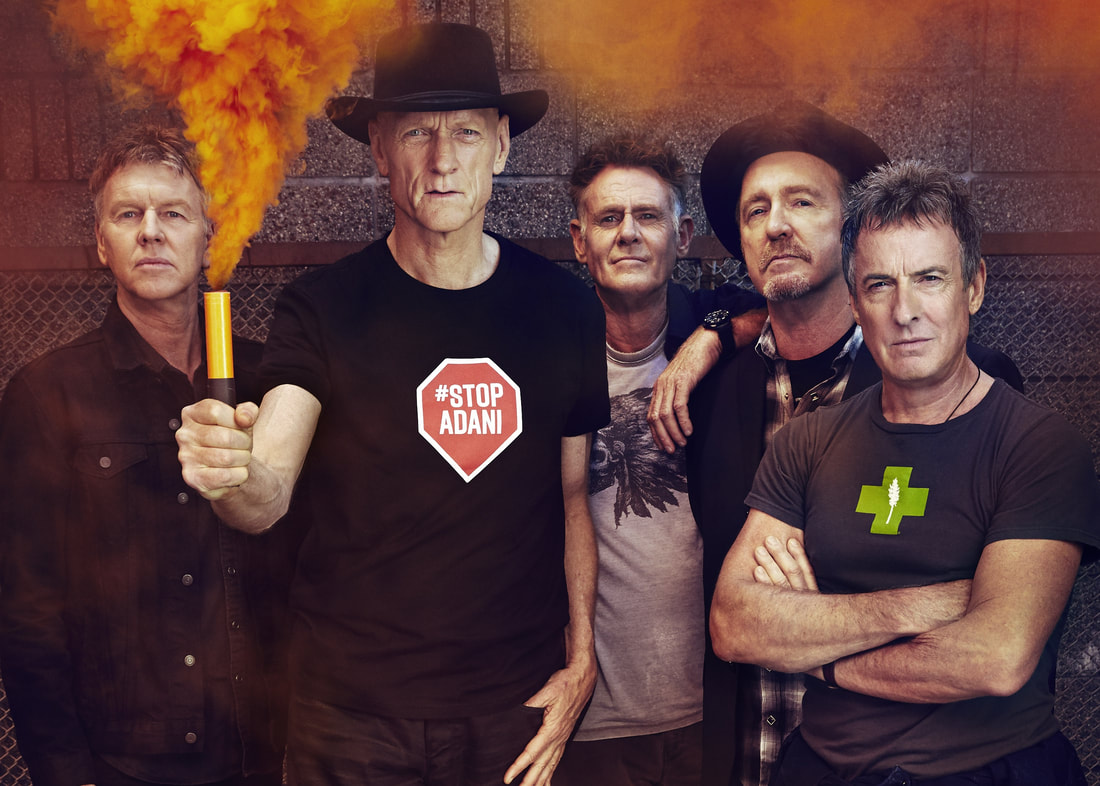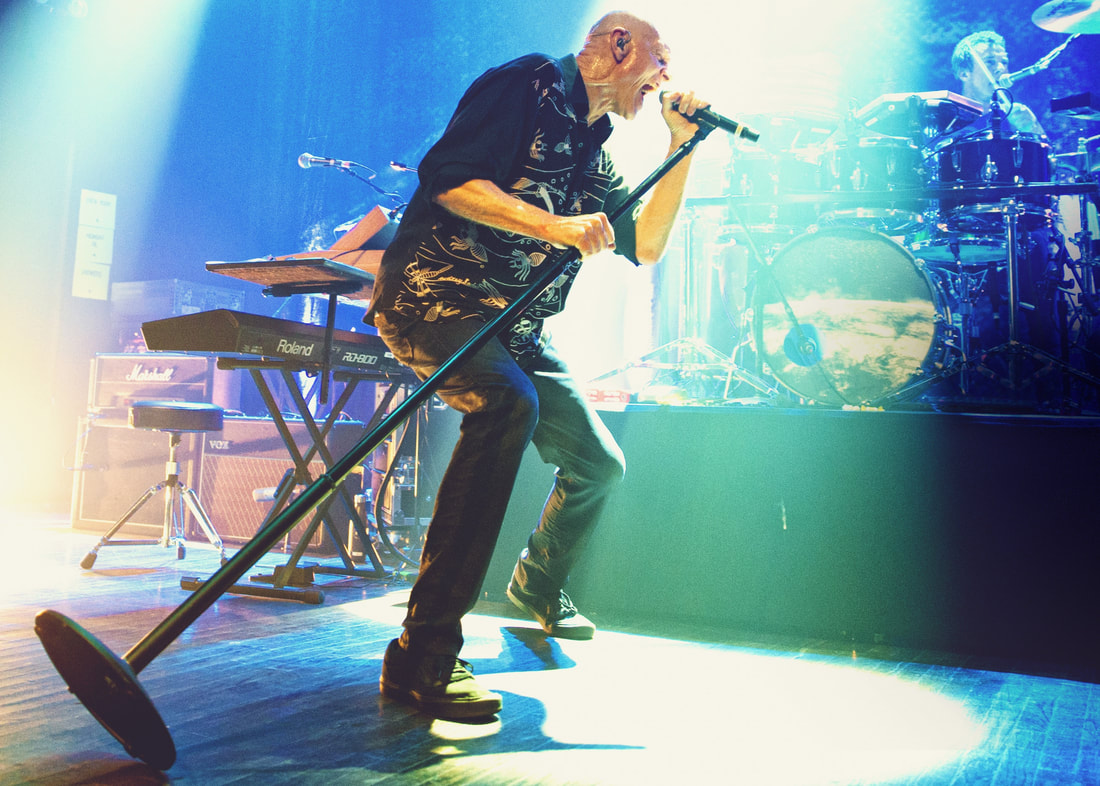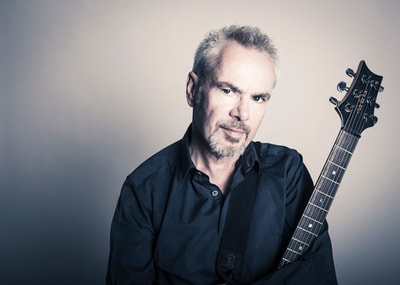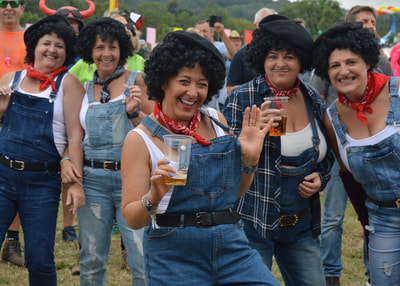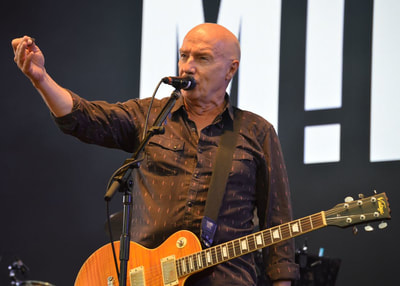|
Trailblazers Midnight Oil burst out of their native Australia in the late 80s, with their worldwide smash ‘Diesel And Dust’. Critically lauded, Rolling Stone named it the best album of 1988, and later ranked it the 13th greatest record of the 1980s. Featuring the anthemic ‘Beds Are Burning’, the song revealed a band with a long-held political conscious. Disbanding in 2002 following front man Peter Garrett’s move into politics, they returned in 2017, taking a trip around the world and playing to over a million people on their ‘Great Circle’ tour. Coming back around to play the places they missed out on that trek, we caught up with Oils’ guitarist and song writer Jim Moginie, for a chat about music, culture, and roots. Blue sky mining; Eamon O’Neill.
Hi Jim, how are you today?
I am very good, thanks. It’s night time here in Australia of course, but I’m very well, thanks, mate. Midnight Oil are back, and the band are once more making the trip over to Europe, with shows in London, Manchester and Dublin among those dates. It’s great. We spent a lot of time in London making albums in the early 80s, and I spend a lot of time in Ireland now, and Manchester has got a great music scene up there. It’s going to be a real blast because we’re going to be playing everything we’ve written in the last forty or something years. We’re going to try and do a bit of a cross section and change it every night; it’s not just going to be a greatest hits thing, although they will be there, if anyone’s worried! There are some songs that you just have to play. We will be playing ‘Beds Are Burning’, of course. We’ll be just getting up there and giving it a go. We’ve been in Australia writing some new songs and just generally reacquainting ourselves with each other. In 2002, Peter [Garrett, vocals, harmonica] went into politics as you probably know, so the band split. The band just went off into the wilderness for a while, doing different things. It’s twenty-five years since you last played in Dublin, and you’re returning to the same venue; the Olympia Theatre. I know! I think when we played there they had this thing, sort of ‘The Olympia at Midnight’, which was a play or something. It was Beckett or something, so we had to clear all the gear off the stage so that that they could do the Beckett thing at midnight. That was interesting; “So they do two shows a night!” It sort of sounds like an Australian RSL club [Returned and Services League of Australia], or something. It’ll be great to come play The Olympia again. I can’t wait; it’s a great venue, and a great room, and it’ll be really good. You’ve got Irish roots, haven’t you? I’m an Offaly man, and I spend a lot of time down in Carlow. Will I get the chance to visit the relatives when I’m over? Yep, and they’ll all be at the show. There’s so many guests coming that it’s unbelievable! I don’t know how to break it to the band; there’s so many people coming, I don’t think I can get them all in! We’ll have to figure it out. [*Laughing*] I think some of them might have to buy tickets, actually! Midnight Oil disbanded in 2004, and at that time, did you think that really was the end of the band?
Yeah, I did. [*sighs*] I thought; “Well, I’ve got to get on with my life”. When it finished, it took me a couple of years to get my bearings. I started producing records and I started to do solo records, and I actually played in an Irish band in Australia, believe it or not. I played in a band with Rob [Hirst, drums] and Martin [Rotsey, guitar] from The Oils. I also played guitar orchestra music, and I actually played with the Australian Chamber Orchestra. I’ve done soundtracks, and I’ve done a million different things since then, which has been a great experience. I’ve even been a session player and done country records - anything that sort of makes you keep playing. Were you surprised then, that the band did come back together? I kind of assumed it was finished, but when Peter came out of politics, it was like; “Okay, well he’s out; now what happens?” I’d been playing along with Martin and Rob, and Bones [Hillman, bass] he lives in Nashville, so he wasn’t around, so we were just playing together with Brian Ritchie from The Violent Femmes, who’s a good mate. We were doing a lot of stuff together, so the band was almost kept going, in a way. We kept our relationship together, and we’d been playing together, we still knew each other, so when Peter came back to sort of say; “Look, what do you reckon?”, well, we were already playing anyway, so we thought; “Yeah, why not?! See what happens”. What that ultimately led to, was 2017’s 'The Great Circle' tour. 2017 was an amazing year. We played to about a million people all over the world. We played seventy-seven shows, and they were all really good and successful, and there was life in the old beast; it wasn’t like a bunch of old farts standing up there with wigs and make-up on; there was life in it. Did it feel good to be back on stage with the original band? It’s not like some bands where they don’t talk to each other; we’re all really good friends, and we’re not holding daggers at each others’ throats. We’re very friendly because we still know each other, and our families hang out together. We’re just interested in each other, and I think we’ve found that we’ve something to say. I think that’s been the way forward for us to do this tour - at least it was when it was successful in 2017. But in 2018, and now, we’re thinking; “Why don’t we do something with this great thing we’ve created?”, which is the protest, or talking about the world, or perhaps some might call it ‘political’ – which it is. Not that many people are actually doing that. So you’re thinking about recording new material? I think if we can come up with something that’s of the time, then it’s worth doing, and it’s valid; it’s not just playing the old songs and then not doing anything else. I think we will be doing new material, and scoping it out and seeing how we’re all feeling, and playing together and having a bit of fun with it. So, hopefully, if the creative process is an organic process. I can’t say too much because I don’t really know, but I know that the feeling is there within us that there’s something to say, and there’s something to do, and there’s something to play. What was it like for those first few dates after coming back together?
I think we were really surprised by the reaction in 2017, when I think about it now, I think; “Well, there’s some good stuff there, so no wonder people seem to like it”, I don’t know. It’s things we’ve created together as a family, and it’s playing to people who are excited about it. Those 2017 shows saw you playing the ‘Diesel and Dust’ album in its entirety; What was it like for you to revisit it? Well, it just took me back to the time. I remembered where we were and what we were doing, and what our haircuts were, and whatever it was. We did that, and we did an album called ‘Ten To One’ as well, which was out in 1982. We did another album too - it might have been ‘Blue Sky Mining’ I can’t remember [during the tour] - but we realised playing that record ['Diesel and Dust'] that yeah, it did feel really complete and together. We may be doing that on this tour; some places where we’ll come and play a certain album. We tend to surprise ourselves; we don’t know when we’re going to do it! Playing an album’s about a forty-five minute exercise, and then there’s all the other stuff, so it doesn’t really take away from the show. You play it all in one slab, in the original order, which is important so people can get the feeling of the album and the flow of the songs one into the other. ‘Diesel and Dust’ is an incredibly iconic release. Well, thanks for saying that. That’s a really nice thing to say about the album. It did do pretty well, and it surprised us, especially as the record was about Aboriginal land rights in Australia. We sort of thought; “Well, no one’s going to want to know about that”, but in fact, it struck a chord because there’s always been battles in all the different parts of the world where there’s indigenous people. It did strike a chord, especially in Europe, which really surprised me. I think people in Europe perhaps are more interested in politics than in other parts of the world, because it’s in your face, and you have to deal with it. Making records and saying something about something like that, people knew, and it wasn’t a big jump for them to get it. Sitting down and writing ‘Beds Are Burning’, had you any idea how huge that song would be? Absolutely zilch. There was no sense that there was any more legs to that song than any of the other songs on that album. We were all really keen on all of them, but I think there was something about the beat, and there was something about what we were saying and how it was said, and the sound, using the acoustic guitars. When we wrote the song, it took us only about two hours; we had the riff, Peter came in with some lyrics and put them on the table; “The time has come to say fair’s fair / to pay our rent, to pay our share”; Rob had the chorus; I did some bits in the middle, I had a bit of music; I mean, honestly, as a band, we just cobbled it together out of whatever we had, and then [*sings intro riff*], well, let’s get people’s attention. Do you remember what early reaction was like to it? It was sort of a crazy idea, but we did a little demo of it, and everyone we played it to said the same thing that you said; “It’s a hit!” And we’re like; “What? You’re kidding me.” So we recorded it, and then when we were mixing the record, I remember we were playing a gig that night in Sydney, and Rob, our drummer said; “How does the mix sound?”, and I went; “Do you know what? It sounds ‘anthemic”. I’d never said that about any of our music before, and it was a real surprise when it came out of my mouth; I couldn’t believe I was saying it. But, it was, and I think that’s what people connect to, and the fact that it’s about something. And people can misinterpret the song and think it’s about sex – people in America thought it was, and you can take it on that level if you want, but it really isn’t what it’s about. Do you still enjoy playing 'Beds are Burning' over thirty years later? I never get sick of playing it; you can inhabit a song in different ways every time you play it; you don’t have to play it exactly the same, you know? We did go through a stage where we didn’t play it, but it didn’t go down very well! The song had a much wider cultural impact.
I think our visit to the aboriginal communities in 1986 gave the song a rite of passage. We went out there, we bothered to talk to people and discuss what was going on in those communities where they have amazing art and music and everything; community and family, and then all these bad problems; alcoholism and dispossession and depression and suicide. We sort of understood that, and somehow, because we did that, the song got rites of passage to go to the world. I don’t want to get too cosmic about it, but I think that’s kind of what happened with that song. You were one of the first to go out there and connect with those people. White people hadn’t bothered to go out there and talk to Aboriginal people in Australia, so, I think they saw us as somewhat of a people that could spread the message to the rest of the world, which is what we did. We were one of the people that did it; it wasn’t just us; other people did it along the way. There are people doing it now, and every few years there’s another one bringing a whole understanding of Aboriginal culture to the world. It’s amazing it struck a chord, and I’m still quite amazed by it. Finally, Midnight Oil have clearly got nothing left to prove; what do you think the bands legacy should be? Well, I think I’m happy with the way it is. I think we could have become a bigger band if we’d become more about corporate record labels and giving them what they wanted and doing hits over and over again. I don’t think we did that. I don’t think it was in the people in the band to do it. I think we just did it the way we did it, and I’m proud of the way we did it. It could have been different; it could have been as big as U2, but it wasn’t, and so, fair play; let it be the way it is. There’s a certain poetry to the way the band rolled its stuff out, and I’m happy with it. We were really true to ourselves the whole way down the track. I wouldn’t change a minute of it, I wouldn’t change a note of it, really. And it stands up really well. What our legacy should be? That’s not a question for me; I think we just did it, and have carried on playing again and bringing the songs back to life, and playing in front of people, and giving it a red hot go, really. And you're continuing that legacy with the band reactivated. Hopefully people are going to rock up and have a bit of fun, but also get the message and think and dance at the same time. That’s what the band’s always been about; not sort of bombarding with politics, but sort of; “What do you think about this subject? It’s important to you; why don’t you think about that?” It’s not so much about us saying; “Think this’, or ‘think that’ – we’re a bunch of lefties”, no it’s a conversation between people that are on the right, and people on the left and people that are in the middle. I think it’s great that it’s more of a conversation, and I think that’s the whole way the keep it. And with the song writing, that’s what it’s always been about too. Like this interview? Like us on FaceBook and follow us on Twitter for regular updates & more of the same! Midnight Oil play Manchester Apollo on Sun 9th June, and London's Brixton Academy on Thurs 13th June. For tickets, click here. The band's Dublin Olympia show takes place on Tues 11th June. Click here for tickets. |
|
Midnight Oil
"I think we’ve found that we’ve something to say, and now we’re thinking; “Why don’t we do something with this great thing we’ve created?" - Jim Moginie.
© 2016 - 2024 eonmusic.co.ukContact: [email protected]
|

